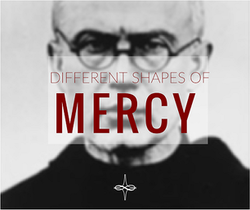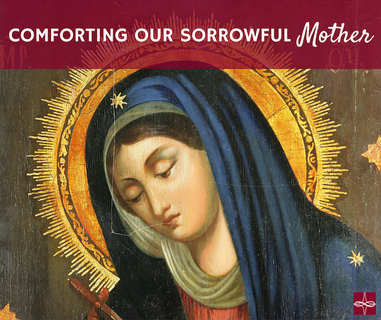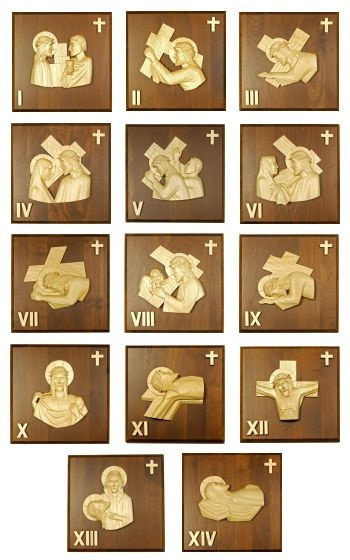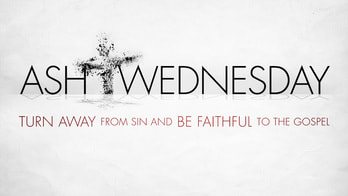|
What do you do when you are feeling sad, scared, or anxious? Where do you turn for a source of comfort?
The Blessed Mother knows all about sorrow. She is always ready to comfort any one of her children who come to her in prayer. But, have you ever thought about offering comfort to her? The Feast of Our Lady of Sorrows is today, September 15, 2015. Perhaps you might be able to find a little bit of time to spend with her. Much less familiar than the Rosary is the Chaplet of the Seven Sorrows. The chaplet is made up of seven groups of seven beads. Each group is separated by a single bead. In praying the chaplet, you would meditate on each of the seven sorrows while reciting one Our Father and seven Hail Mary’s. If you would like to pray the chaplet, this webpage can be of help. The Seven Sorrows of the Blessed Virgin Mary: The Prophecy of Simeon The Flight into Egypt The Child Jesus Lost in the Temple Mary Meets Jesus Carrying His Cross Mary at the Foot of the Cross Mary Receives the Body of Jesus Mary Witnesses the Burial of Jesus The seven sorrows span from the earliest days of Jesus’ life to His final hours. All of the Blessed Mother’s sorrows tie back to her Son. For a mother, very few things compare to watching the child she loves hurting. Although the Blessed Mother certainly put her entire trust in God, she still would have known terror when the Holy Family fled to Egypt to escape the threat of King Herod to save their precious newborn Son. Not only was the Holy Family far from home, but they had no idea when it might be safe to return to Nazareth. Any parent can tell you how scary it is when their child is lost. No words would be adequate to describe how scared Mary must have felt as she and Saint Joseph spent three full days searching for Jesus before finding Him teaching the elders in the temple. The next time you ask the Blessed Mother for her intercession before God, remember that she understands sorrow and anxiety. During her own life, the Blessed Mother understood suffering; just like all of us today understand the experience of suffering in our own lives. She is always there, more than happy to pray for us. Perhaps you might return the favor, and find a bit of time to spend with her. Our Lady of Sorrows, pray for us! Jennifer Beckmann is an Administrative Secretary for the United States Conference of Catholic Bishops.
0 Comments
 Pope John Paul II, in his homily at the Mass he celebrated at the site of the Brzezinka (Auschwitz II) Concentration Camp in 1979; called St. Maximilian Kolbe “the patron of our difficult century.” Although the dawn of a new century has since come, St. Maximilian remains a strong symbol of Christian charity today. Seventy-four years ago tomorrow, he offered up an ultimate act of charity while knowing it would cost him his own life to save another. While Maximilian Kolbe was a prisoner at Auschwitz, several men escaped from the camp. In an attempt to deter other prisoners from trying to escape, the officers chose ten men to starve to death. When one of the men chosen expressed his anguish because he had a wife and children, St. Maximilian willingly volunteered to take his place. After two weeks without food or water, St. Maximilian was the only one of the ten still alive. At that point, he was killed by a lethal injection. Although we cannot know for certain what happened while the ten men were held in the bunker, there are reports that St. Maximilian spent much of the two weeks leading the other nine in prayer to the Blessed Mother. Most of us will not be called to make the same sacrifice as St. Maximilian did for a stranger, but God calls each of us to works of charity and mercy. The Corporal and Spiritual Works of Mercy are simple ways to love God and to love our neighbor. This might mean sacrificing your Saturday afternoon to drive an elderly neighbor to her doctor’s appointment or to volunteer at a food pantry. Mercy might take the form of comforting a coworker or classmate (regardless of whether or not you are friends) when you notice them grieving. Mercy means not honking or cursing, but instead offering up a prayer when someone cuts you off in traffic. Mercy could mean not buying another sweater when you already have ten hanging in your closet and instead donating the money to a charity for the homeless. Every act of mercy requires some sacrifice--whether you are giving up time, money, or a bit of yourself--but there is no simpler way to tell God that you love Him. St. Maximilian Kolbe, pray for us! Jennifer Beckmann is an Administrative Secretary for the United States Conference of Catholic Bishops.
Pope John Paul II, in his homily at the Mass he celebrated at the site of the Brzezinka (Auschwitz II) Concentration Camp in 1979; called St. Maximilian Kolbe “the patron of our difficult century.” Although the dawn of a new century has since come, St. Maximilian remains a strong symbol of Christian charity today. Seventy-four years ago tomorrow, he offered up an ultimate act of charity while knowing it would cost him his own life to save another.
While Maximilian Kolbe was a prisoner at Auschwitz, several men escaped from the camp. In an attempt to deter other prisoners from trying to escape, the officers chose ten men to starve to death. When one of the men chosen expressed his anguish because he had a wife and children, St. Maximilian willingly volunteered to take his place. After two weeks without food or water, St. Maximilian was the only one of the ten still alive. At that point, he was killed by a lethal injection. Although we cannot know for certain what happened while the ten men were held in the bunker, there are reports that St. Maximilian spent much of the two weeks leading the other nine in prayer to the Blessed Mother. Most of us will not be called to make the same sacrifice as St. Maximilian did for a stranger, but God calls each of us to works of charity and mercy. The Corporal and Spiritual Works of Mercy are simple ways to love God and to love our neighbor. This might mean sacrificing your Saturday afternoon to drive an elderly neighbor to her doctor’s appointment or to volunteer at a food pantry. Mercy might take the form of comforting a coworker or classmate (regardless of whether or not you are friends) when you notice them grieving. Mercy means not honking or cursing, but instead offering up a prayer when someone cuts you off in traffic. Mercy could mean not buying another sweater when you already have ten hanging in your closet and instead donating the money to a charity for the homeless. Every act of mercy requires some sacrifice--whether you are giving up time, money, or a bit of yourself--but there is no simpler way to tell God that you love Him. St. Maximilian Kolbe, pray for us! Jennifer Beckmann is an Administrative Secretary for the United States Conference of Catholic Bishops. “The month of June is singled out, in a particular way, for the devotion to the Sacred Heart of Jesus. To celebrate the Heart of Christ means to turn toward the profound center of the Person of the Savior, that center which the Bible identifies precisely as his Heart, seat of the love that has redeemed the world. If the human heart represents an unfathomable mystery that only God knows, how much more sublime is the heart of Jesus, in which the life of the Word itself beats. In it, as suggested by the beautiful Litanies of the Sacred Heart that echo the Scriptures, are found all the treasures of wisdom and science and all the fullness of divinity.”
-St. Pope John Paul II, on the Solemnity of the Most Sacred Heart of Jesus, June 24, 2002. Tomorrow, June 12th, is the Solemnity of the Most Sacred Heart of Jesus. There are many pious devotions to the Sacred Heart which are worthy of practice. Since it is impossible to do justice to them all in just five hundred words, just three of the 33 invocations from the Litany of the Sacred Heart of Jesus (which St. Pope John Paul II described as “beautiful”) will be the focus here. Don’t limit yourself to the brief snippets here! If you pray the Litany in its entirety, you might find an invocation which best speaks to your own prayer life. “Heart of Jesus, full of goodness and love, have mercy on us.” Can you think of a powerful example of love and goodness? Maybe you think of Mother Teresa and her care for the poorest of the poor. Maybe Saint Maximilian Kolbe, who was willing to die in the place of a stranger at Auschwitz so that the man’s children would still have their father comes to mind. There are many touching, beautiful examples of real love and compassion in the world. The love and goodness of Jesus surpasses them all; His love extends to us all, even when we fail to love Him in return. “Heart of Jesus, obedient to death, have mercy on us.” Jesus has a very difficult cross to bear. Before He picked up His cross (literally), He knelt praying in the garden of Gethsemane. Although He prayed that the task might be taken away from Him, in the same breath, He reconciled Himself to the Father’s will (Mt 26:39). Jesus followed the Father’s will because He loves each one of us. Each of us have much smaller crosses to carry; relatively few of us in the United States will be asked to give our lives for our faith. It is easy to grumble when difficulties come along; I myself, like most of us, often fall into that trap. Jesus resigned Himself to the Father’s will so that we might be saved. He wants to give us the graces we need to do the Father’s will, just like He did. “Heart of Jesus, source of all consolation, have mercy on us.” In your most sorrowful moments, where do you turn to for comfort? A close friend or family member? A beloved pet? Chocolate? In times of sadness, there are few things more comforting than a hug from someone you love. Jesus’ heart is overflowing with love for you and He is there with outstretched arms ready to wipe away your tears. You would be hard pressed to find a better listener or someone who loved you more than Him. The Solemnity of the Most Sacred Heart is also the World Day of Prayer for the Sanctification of Priests. If you have a few extra moments to spare tomorrow, remember to say a prayer for the priests in your parish and any other priests who have touched your life! Jennifer Beckmann is an Administrative Secretary for the United States Conference of Catholic Bishops. For more information on Prayer life, please see our Prayer and Catechesis Resource Page! “For God so loved the world that he gave his only Son, so that everyone who believes in him might not perish but might have eternal life. For God did not send his Son into the world to condemn the world, but that the world might be saved through him.” (John 3:16-17)
Most parents feel incredibly protective of their children and hate to see them hurting. Chances are, if you ask your mom or dad, they would say that watching you break an arm, fall off your bike, or be picked on by a bully was painful for them. Maybe you are a parent who has experienced how hard it can be to see your child in pain. God, who is infinitely perfect, loved us so much that He was willing to sacrifice His only Son so that we would have a chance at Heaven. God knew that some would chose to reject His love. He knew exactly how painful it would be, for both Himself and the Blessed Mother, to watch His Son suffering on the cross. On Good Friday, we commemorate the ultimate sacrifice. The Stations of the Cross allow us to journey with Christ the last hours of his life on earth. Even if you are unable to physically move from station to station, it is a wonderful opportunity to mediate on all that Jesus was willing to undergo for our sake. The First Station: Jesus is condemned to death. The Second Station: Jesus carries His cross. The Third Station: Jesus falls the first time. The Fourth Station: Jesus meets His mother. The Fifth Station: Simon of Cyrene helps Jesus to carry His cross. The Sixth Station: Veronica wipes the face of Jesus. The Seventh Station: Jesus falls the second time. The Eighth Station: Jesus meets the women of Jerusalem. The Ninth Station: Jesus falls the third time. The Tenth Station: Jesus is stripped of His clothes. The Eleventh Station: Jesus is nailed to the cross. The Twelfth Station: Jesus dies on the cross. The Thirteenth Station: Jesus is taken down from the cross. The Fourteenth Station: Jesus is laid in the tomb. Imagine how the Virgin Mary must have felt when she met her Son on the way to Golgotha. Her heart must have been breaking watching Him struggle to carry the cross. Her tears must have hurt Jesus’ own heart. After Jesus fell for the third time, He got back up and continued on. He didn’t grumble or complain. It would have been easy to decide that it was too hard and to just stop. When we carry our own cross, however small that burden, it is incredibly easy to complain to God and to say that we cannot do it. We might not be able to on our own, but with God’s help, all things are possible. In His last moments on the cross before He died, Jesus was thinking of us. “Father, forgive them, they know not what they do.” (Luke 23:34) God stands ready to give us His unconditional love and forgiveness. He has already done the hard part. Through His suffering and death, He threw open the gates to Heaven. He is ready to give us the graces to get there. All we need to do is ask Him for it. Jennifer Beckmann is a Staff Assistant for the United States Conference of Catholic Bishops. Did you forget to wash your face this morning?
As someone who doesn’t like to draw attention to herself, stares and questions can make Ash Wednesday hard. It is the only day of the year (at least to my knowledge) where people can immediately identify you as Christian on sight. You don’t even have to do anything; it is right there, spelled out in black and white, on your forehead. For the distribution of ashes, the priest has a couple choices, but one option is to remind the people of their call to “turn away from sin and be faithful to the Gospel.” Jesus asks us to feed the hungry, clothe the naked, care for the sick, and to visit the imprisoned (Mt 25:34-46). How can your Lenten sacrifice live out the gospel message? When I was little, I would give up something that I loved for Jesus, like candy or, as in the case of one really difficult Lent, soda. Making any sacrifice, intending to show your love for God, is a great start, but I encourage you to take it one step further. If you decide to sacrifice your morning coffee, maybe money you would have spent at the coffee house could go to a local charity that provides winter coats for the homeless. If you’ve noticed that you being spending a little too much of your Saturday mornings watching television, this Lent might be a wonderful time to volunteer to stock shelves at your local food pantry or to serve meals at the soup kitchen. Maybe you could wake up an hour earlier to take a lonely, elderly neighbor to Mass. This Lent is the perfect time to be a living witness to the gospel, but that witness should continue even after Easter. That does not mean that you should give up coffee for the rest of your life or that you should never spend another Saturday morning watching television, but it does mean that our desire to make sacrifices out of love for Jesus shouldn’t end just because Lent does. This Ash Wednesday, I encourage you to think about not just how you can live the gospel during the next forty days, but how can you make it a part of your daily life. Ash Wednesday should not be the only day where people can immediately tell that you are Christian; your actions should make it crystal clear all throughout the year. There is no greater compliment than for people to be able to tell that you belong to Christ. Wear your ashes as a proud witness to your belief in Christ, answer any questions that come, and you just might inspire someone else to start his or her own faith journey. Jennifer Beckmann is an Administrative Secretary for the United States Conference of Catholic Bishops. For more information, be sure to check out the Catholic Apostolate Center's Lenten Resource Page! Sacred Scripture is silent on the childhood of the Blessed Mother, but for centuries Catholics in both the Eastern and Western Church have celebrated the moment that she was presented in the temple. This is especially true in the Eastern Church. Tradition (with a small “t”) holds that Saints Joachim and Anne brought their little girl to the temple when she was about three years old. They recognized that she was a gift from God and in their gratitude for the incredible blessing they had received; they wanted to present her back to God.
Our Lady’s presentation in the temple is more than just a touching story of an elderly couple offering their precious child back to God. It can serve as a beautiful reminder that, by the nature of our own baptisms, we too have been given back to God. This is true, regardless of whether that baptism was of the tiniest of babies or this past Easter Vigil. From the very beginning, God had chosen the Blessed Mother to be His own mother. As a baptized Christian disciple, God has a special mission in mind for you. He has a plan for each one of us. By the nature of our baptism, God calls us to become a part of the New Evangelization, to become a missionary disciple of Christ. This mission will look a little different for each one of us. Some might be called to be missionaries in faraway lands, while the majority may be missionaries in their own backyard. Living out your baptismal call can be as simple as spreading the Gospel to a coworker or friend. It can take the shape of helping someone in need. It might be inviting a neighbor to attend Mass with you followed by a fun activity. Many years after her presentation, the Blessed Mother told God “yes” when He asked her to become the mother of His dearly beloved Son. What God asked probably seemed scary. She may not have fully understood all that God was asking of her, but she trusted in Him and said “yes.” It should be the same with us. Even though it might mean stepping outside of our comfort zone or risking embarrassment, God calls each of His baptized children to take a risk and share the Good News. Saints Joachim and Anne recognized that their little girl was something precious from God and that she belonged to God. The Feast of the Presentation of Mary in the Temple tomorrow can serve as a real reminder of our baptisms and that we too belong only to God. What a blessing that is! Jennifer Beckmann is an Administrative Secretary for the United States Conference of Catholic Bishops. “Jesus said to his disciples: ‘Suppose one of you has a friend to whom he goes at midnight and says ‘Friend, lend me three loaves of bread, for a friend of mine has arrived at my house from a journey and I have nothing to offer him,’ and he says in reply from within, ‘Do not bother me; the door has already been locked and my children and I are already in bed. I cannot get up to get you anything.’ I tell you, if he does not get up to give him the loaves because of their friendship, he will get up to give him whatever he needs because of his persistence. And I tell you, ask and you will receive; seek and you will find; knock and the door will be opened to you. For everyone who asks, receives; and the one who seeks, finds; and to the one who knocks, the door will be opened. What father among you would hand his son a snake when he asks for a fish? Or hand him a scorpion when he asks for an egg? If you then, who are wicked, know how to give good gifts to your children, how much more will the Father in heaven give the Holy Spirit to those who ask him?”
The friend in Jesus’ parable is persistent in asking for bread. He did not immediately give up when it seemed that the answer was no. He kept asking until his friend gave him what he needed. Just as the friend did not give up, we should be persistent as well. Instead of simply saying a Hail Mary or an Our Father and then calling it a day, it is important to persevere in prayer. For the intentions that are closest to your heart, remember to pray without ceasing. It has been said that Saint Monica prayed for the conversion of Saint Augustine for thirty years. She refused to give up when all signs seemed to indicate that her prayer went unheard! In reality, God heard her prayer and helped her son to become a great saint in heaven. Just as a little child feels safe running to his father when he needs something, Jesus invites us to treat God the Father the same way. All fathers who love their children want what is best for them. God, our heavenly Father, is no different, except his love for his children is infinitely more perfect. He wants you to spend eternity with him in Heaven. He wants to give you the graces that you need to get there, if only you ask for them. Jesus has made us a magnificent promise! “Ask and you will receive.” Although your prayers may not be answered exactly as you expect, God does promise his children something even better: the Holy Spirit! The gifts of the Holy Spirit are yours for the taking. All you have to do is ask and be persistent asking. Jennifer Beckmann is an Administrative Secretary for the United States Conference of Catholic Bishops Secretariat for Evangelization and Catechesis. |
Details
Archives
July 2024
Categories
All
|
About |
Media |
© COPYRIGHT 2024 | ALL RIGHTS RESERVED







 RSS Feed
RSS Feed